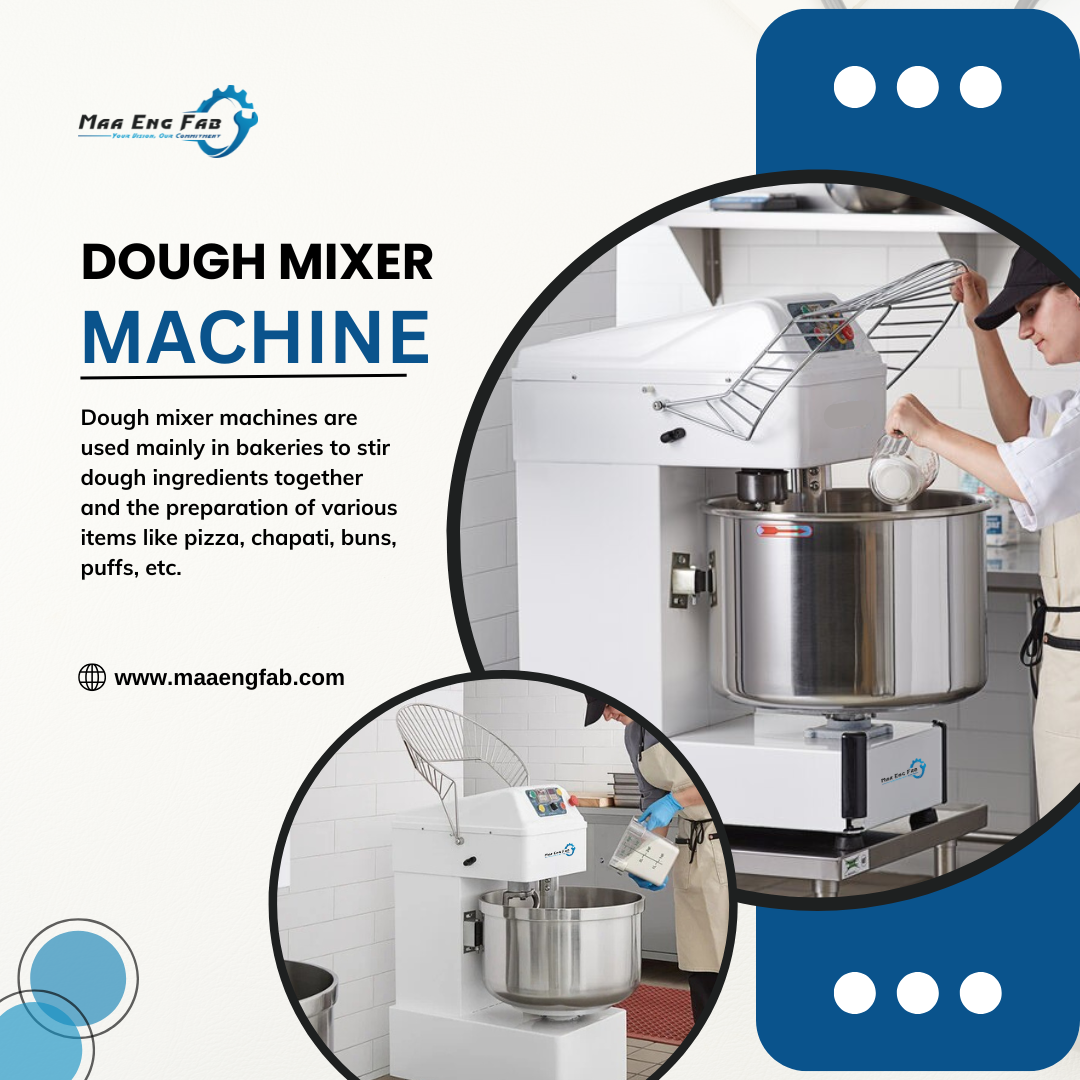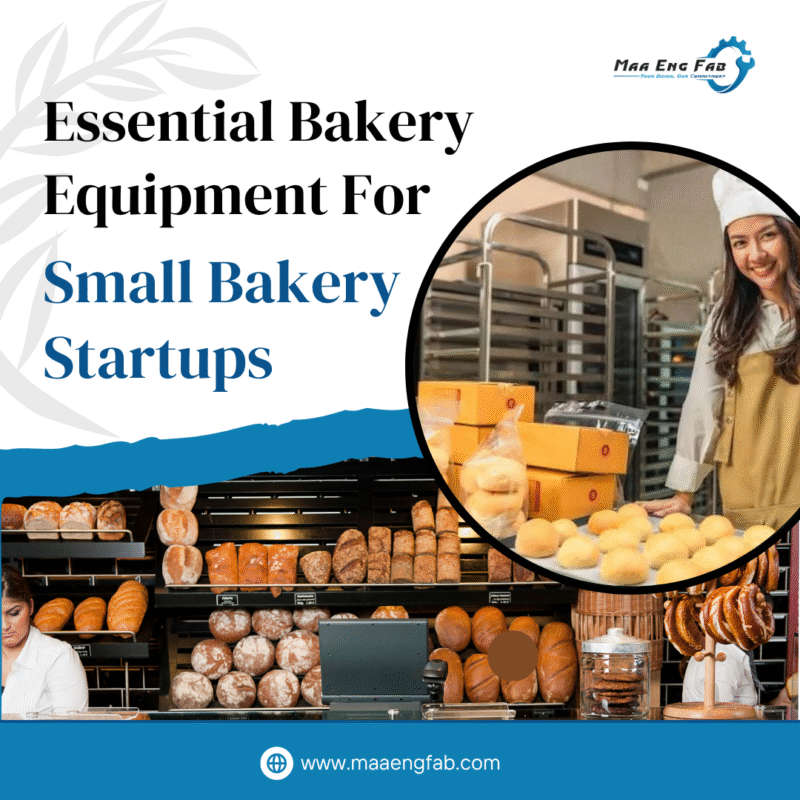Dough Mixer Machine
Starting or renovating a bakery requires the right dough mixer machine. This equipment controls dough quality, consistency, and efficiency during baking. Your bakery’s needs, output goals, and operational constraints should guide your dough maker machine selection. This is from lightweight planetary mixers to heavy-duty spiral mixers. This post covers the most significant dough mixer machine factors to help you choose one.
Dough Mixer Machine Types
It is one of the important bakery equipment. Understand dough machine types and uses to choose the right one for your bakery business. Your bakery’s items determine the type of right dough mixer machine.
Planetary Mixers
Planetary mixers have an agitator that rotates on an offset shaft in a stationary bowl like a planet orbiting a star. Dough hooks, flat beaters, and wire whisks make these mixers versatile. Their versatility lets them whip cream, mix concoctions, and grate cheese in addition to dough mixing.
Spiral Mixers
Spiral mixers are for heavy, low-hydration doughs like pizza, bagels, and artisan breads. These machines hold the spiral hook still as the bowl rotates to reduce heat and promote gluten development. Energy-efficient spiral mixers may combine tiny and large quantities, with some mixing 10% of their capacity. Their design makes them unsuited for other tasks but ideal for bread bakeries. Bread bakers benefit from spiral mixers.
Fork/Diving Arm Mixers
Like hand kneading, dive arm mixers or fork mixers fold and stretch dough using two arms. They produce minimal heat and preserve dough structure for high-hydration dough or delicate pastries, creating a light, airy crumb.
Horizontal Mixers
Industrial bakeries make dough continuously with horizontal mixers. Large cylindrical barrels with revolving agitators can mix hundreds of pounds of dough quickly. Short doughs, pie doughs, and batters work well with these mixers, but the heat can damage yeast-based doughs like bread.
Dough Maker Machine Capacity
How much dough a dough maker machine can make each batch depends on its capacity. Choose the best capacity by estimating bakery output-based daily or hourly dough demands. A 10- to 30-quart mixer is enough for small bakeries and cafés. Compact, planetary models can bake cookies, pastries, and bread in smaller kitchens. Medium bakeries needs may need a 20 to 60 quart mixer to mix many doughs efficiently.
Matching Dough Type and Hydration
Your bakery’s dough mixer depends on its dough type. Different hydration and consistency doughs require different mixing processes for best results. To avoid overworking artisan bread and doughs with 80-90% water absorption, combine gently. These doughs benefit from spiral or fork mixers, which reduce heat and maintain structure. Stronger mixers are needed for bagels and pizza doughs. Powerful driving mechanisms make spiral mixers appropriate for various applications.
Size and Space of Dough Mixer Machine
Your bakery’s dough machine must fit. Ensure the mixer suits your kitchen layout before buying. Small kitchens benefit from 5 to 20 quart countertop mixers that fit on existing work surfaces and take up minimal space. Floor-standing spiral or horizontal mixers with 30–140-quart capacities are for high-volume applications and require dedicated space.
Mixing Speed and Control Evaluation
With several speed settings, a dough mixer machine makes adapting to different doughs and recipes easier. Low speeds help incorporate ingredients without over mixing delicate doughs or batters. High speeds create gluten in bread doughs and whip air into batters and creams. High-volume bakeries or overnight dough preparation benefit from advanced versions with timers and automated mixing cycles.
Consider Quality and Durability
Durability and construction quality are vital because dough machines are expensive. Select stainless steel models that can handle heavy loads and frequent use. Spiral mixers with firm doughs need powerful motors and gearboxes. A sturdy machine reduces baking downtime and maintenance costs. Check warranty choices, which last one to three years, after-sales support, and spare parts. Trusted Kitchen equipment manufacturers with good customer service can protect your investment.
Budget and Cost
The prices of dough mixer machine vary by type, capacity and features. Industrial spiral or horizontal mixers cost thousands to tens of thousands, home or bakery planetary mixers cost hundreds. Budget for the machine’s long term value not just the upfront cost. A better dough maker machine costs more but lasts longer, uses less energy and requires less maintenance. Factor in installation, staff training and upkeep. If budget is an issue consider financing or buying a refurbished machine from a reputable seller that meets your quality standards.
Conclusion
The right dough mixer machine will boost your bakery’s productivity, quality and profit. Consider production capacity, dough type, space, mixing speeds, durability and pricing when choosing a mixer for your bakery. A good dough mixer machine – planetary, spiral or horizontal – will streamline your operations and grow your business. Test and compare options to ensure your bakery can produce high quality baked goods.





